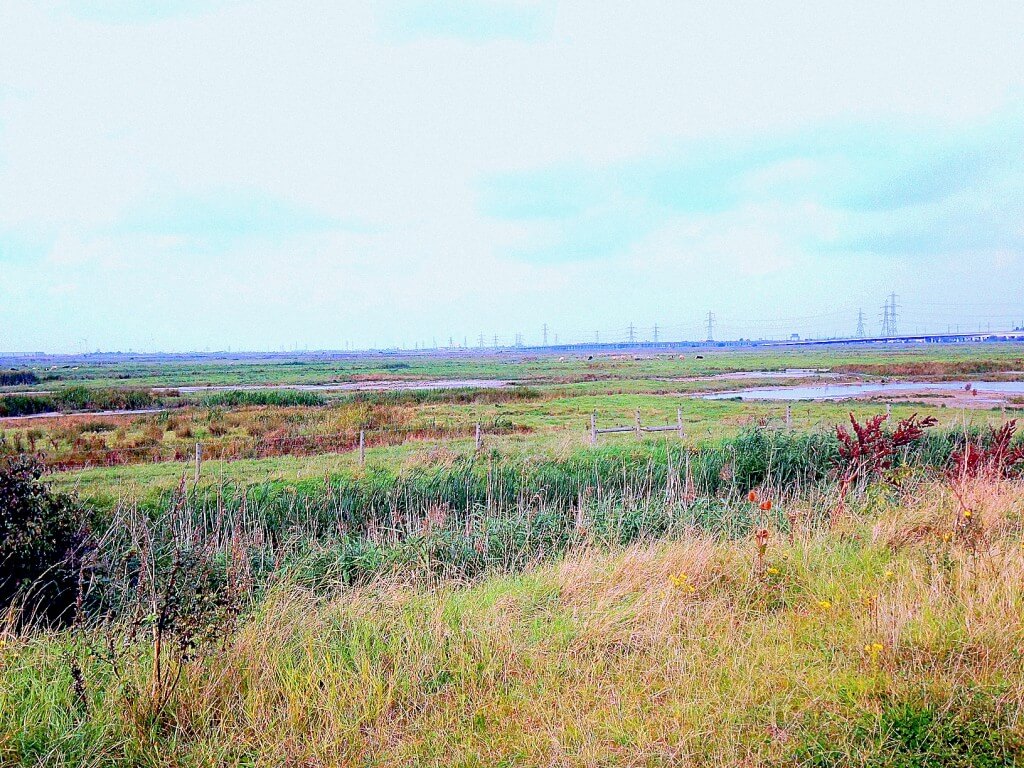Yesterday I spent a lovely few hours at the RSPB nature reserve at Rainham Marshes.
I like Rainham, with its quirky-looking visitor centre and its medieval grazing marshes surrounded by the hustle and bustle of modern life. Planes fly over, boats pass on the Thames, cars and lorries pass along the roads, and trains, including Eurostars, trundle or whizz past.
But you can, most of the time, put all that out of your mind and concentrate on the wildlife. At least you can, if you don’t keep running into people you know! It was, of course, not surprising to meet a few former colleagues at an RSPB nature reserve but I clocked up quite a few yesterday including a couple of senior managers more often chained to desks than let out into the environment. And some Natural England staff and trustees. And a couple of readers of this blog and my books.
![By Sarah (Flickr: Water vole - Arvicola amphibius 2b) [CC-BY-2.0 (http://creativecommons.org/licenses/by/2.0)], via Wikimedia Commons](https://markavery.info/wp-content/uploads/2013/01/800px-Water_vole_-_Arvicola_amphibius_2b-150x150.jpg)
The birds were a bit easier for me to cope with on my own – a few summer migrants still around (Chiffchaff, Swallow and Sand Martin), a brief view of a Peregrine and some Snipe, a Kingfisher and lots of singing Cetti’s Warblers. And I can do the butterflies too – Red Admirals, Speckled Woods and Large Whites. I even, now, think I can identify some of the dragonflies – Emperor and Common Darter.
This is the time of the year when summer breathes its last. That last gasp is surely now. It’s been an Indian summer and one day soon it will start feeling cold – colder because it has been so warm for these September days. But yesterday it was lovely and warm at Rainham. Was that the last day of summer?
![By Paul smith (Own work) [CC-BY-SA-3.0-2.5-2.0-1.0 (http://creativecommons.org/licenses/by-sa/3.0) or GFDL (http://www.gnu.org/copyleft/fdl.html)], via Wikimedia Commons](https://markavery.info/wp-content/uploads/2013/01/800px-Rainham_Marshes.jpg)
[registration_form]

Rainham is a great nature reserve – I love it – but I don’t think RSPB or the conservation sector at large have really got the message it sends – that we could do the way we ‘finish’ our cities completely differently. Rainham sits (and until recently was part of) in a devastated landscape – greenbelt at its worst, mineral working, landfill, ponyculture and fly tipping. 60 years on the principle reason for the Greenbelt remains as valid as ever, stopping urban sprawl, but it is – and always has been – a negative rather than positive measure, with the potential through ‘permitted use’ and hope value to leave a real mess – and east of London it did just that. But places like Rainham are the answer, as are the community woods planted by the Forestry Commission and others up the Rainham river – but, sadly, there’s been a complete failure to realise that, combined, these initiatives build up to something much bigger – a new, green setting for our towns and cities, accessible countryside right on people’s doorsteps, beauty, peace and wildlife – but also, potentially, flood containment upstream, a place for runoff to go locally, and downstream grey natural grey water cleaning through reedbeds and flood meadows. The first community woods are on the verge of producing their first firewood – and, like the wetlands, they are a home for nature, in contrast to the negatives of many of the higher tech solutions to sustainable energy, flooding and the other challenges of global warming.
I find your comment about putting the hustle and bustle into the background interesting. I have the greatest of difficulty doing that!
I live in West Wales, which one might consider pretty quiet, but I even find planes at 35 thousand feet off putting. Any main road can ruin a dawn chorus if one noisy lorry heads along, or trying to listen to tawny owls and a motorbike on the bypass 2 miles away messes it up until it’s gone.
Now I know I am in a privileged place to complain at what most people reading this will think are tiny irrelevances…….so my apologies to you.
But, my point is that the world is becoming more and more noisy and we seem to accept this. Have you noticed how noisy some road surfaces can be? Surely we should be working to quieten all this sort of pollution down!
Planes, trains, cars – just record half an hour of bird song at your local favourite birding spot. Return home, put on headphones and listen with your eyes shut – I think it will make you think!
MW – I tend to agree, but considering where I was yesterday, it was remarkably quiet – that’s probably why I noticed, and why I remarked on it.